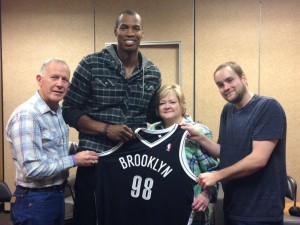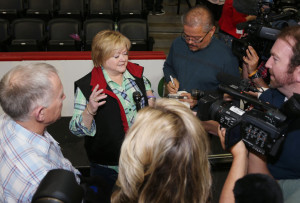Dear Friend,
A few weeks ago the National Basketball Association surprised the Foundation on a quiet Friday evening by announcing it would donate the proceeds of Jason Collins’ jersey sales to the Foundation and our friends at GLSEN.
This gift, which will amount to at least $50,000 for each group, is an amazing boost to our resource, outreach and advocacy programs. More importantly, it represents an incredible gesture of moral support for the entire LGBT community from the professional sports world, one that would have been unthinkable even a few years ago.
Why unthinkable? As a sports fan, and as a friend of the seriously sports-loving Shepard family, I’ve long been aware of an invisible barrier between the LGBT population and the practitioners and followers of professional sports in the U.S.
 Professional sports, we’ve all heard in the media or been told by acquaintances, are a macho, not-gay-friendly world. No gay players, no gay owners, not many visible gay fans, squeamish taboos about showers and changing rooms – and not much faith that it would ever change.
Professional sports, we’ve all heard in the media or been told by acquaintances, are a macho, not-gay-friendly world. No gay players, no gay owners, not many visible gay fans, squeamish taboos about showers and changing rooms – and not much faith that it would ever change.
Personally, I’ve been an NFL fan for a lot longer than I’ve identified as gay. In our little office alone, there are four fantasy-football participants (Judy won her league last year), a Gonzaga basketball nut, an all-sports Wyoming Cowboys fan, and a Carolina Gamecocks helmet sitting on a filing cabinet. But I’ve always thought we must just be in the obvious minority – an unseen gay audience. And a lot of us must have felt similarly; instead of integration we drove a profusion of LGBT-specific softball teams, rugby squads, flag-football leagues, right up through the Gay Games. Gay fans, invisible to the mass-market audience, were building parallel cultures to those barred from their participation.
 Now all of a sudden those old barriers are melting away. Collins’ brave decision to simply be himself, followed by a return to active play, has dovetailed with the similar stories of NCAA football star Michael Sam, Notre Dame tennis standout Matt Dooley, WNBA top-pick Brittney Griner, soccer Olympian Megan Rapinoe, and still others, in the last few years. This is what success looks like.
Now all of a sudden those old barriers are melting away. Collins’ brave decision to simply be himself, followed by a return to active play, has dovetailed with the similar stories of NCAA football star Michael Sam, Notre Dame tennis standout Matt Dooley, WNBA top-pick Brittney Griner, soccer Olympian Megan Rapinoe, and still others, in the last few years. This is what success looks like.
Two weeks ago Jason Collins and the Brooklyn Nets came to Denver to play our Nuggets and meet privately with Matthew’s parents and brother after the game – a gesture of personal kindness. The media found out and the phones and e-mails lit up the office with interview requests. The family politely declined most of the attention, and when they did speak, they made a firm point: Jason Collins plays basketball, and his career, and the public’s focus, should be on basketball too. And one day, through the actions of many, being out in the workplace will be commonplace, and the world will see it that way too.
A few of the local TV sports reporters wanted to explore what the shattered barrier meant. I visited studios and had long conversations about Collins, coming out in the workplace, and the culture of locker rooms. What tone would the coaching staff have to take to ensure Michael Sam a safe and welcoming place to play? How would the NFL’s groundbreaking report on the Miami Dolphins hazing scandal shape player dynamics? How many coming-out stories would have to emerge before their news value subsided? Thoughtful conversations that were a joy to have – but there was unmistakable look of surprise behind the cameras. How could an LGBT organization, and Matt Shepard’s family, be so devoted to the deep details of professional sports? Could the Collins story just be a window into the evolution of workplace equality, and not a stand-alone civil rights breakthrough?
 It’s wonderful that Jason Collins can come out and keep his job in a profession that so recently looked like it might be cold or even hostile to a gay player. It happened because he was honest, the Nets wanted a center, and he was the best fit on the market. That’s success. In most states, people with any kind of job can be fired on a whim if their supervisor doesn’t approve of who they are or whom they love. That’s adversity.
It’s wonderful that Jason Collins can come out and keep his job in a profession that so recently looked like it might be cold or even hostile to a gay player. It happened because he was honest, the Nets wanted a center, and he was the best fit on the market. That’s success. In most states, people with any kind of job can be fired on a whim if their supervisor doesn’t approve of who they are or whom they love. That’s adversity.
There’s a mix of each phenomenon in the other, too. Amid the success, there remain gripers and axe-grinders complaining on talk radio and message boards from here to the ends of the Internet. In their eyes, any attention to Collins’ personal honesty is some kind of affront to the sport, to morality, to … something. Cowards who hide behind false names accuse him of weak game skills, cynical media exploitation, vulgar practices and conspiratorial motives – anything to convince themselves and their ilk that our community is somehow in the wrong to seek, deserve and demand equal treatment and simple respect. That’s what adversity looks like, cowering next to success. It’s ugly, and dispiriting. I’ve learned to dismiss comment boards online, and it still made my blood boil. The lesson is, let it simmer down, and get back to work.
Amid the adversity, meanwhile, success is sprouting out. In recent weeks the usual apologists for homophobia, in Congress or legislatures or in the punditocracy, have spectacularly overreached themselves. They say the LGBT community is now a band of bullies who persecute the religious-minded and victimize people for their simple desire to dish up another heap of second-class citizenry for us all. The widespread public outrage at Arizona lawmakers, who seek to protect imaginary martyrs from the scourge of serving the public, is a fresh new script in a long saga. The quality of the political attacks on our community, frankly, has gone downhill fast, and the broad public, not just ourselves and our loved ones, are having no more of it. That’s what success looks like, mushrooming out of the endless decades of discrimination. Let’s take strength from the victory – and rather than celebrate, apply it to the dozen other states where ill-considered green lights are being flashed to those who hope to marginalize and punish us.
This week there are real victories to be won. Ohio lawmakers are trying once  again to move an LGBT-inclusive hate crime bill forward, to pull the Buckeye State out of the shrinking minority of states with no such law. Couples are fighting through the courts in more and more states for the right to marry, including Matt’s home of Wyoming, where lawmakers continue to sidetrack and shut down debate on the issue. Judy Shepard is heading back from another inspirational speaking program, this time reaching one of her youngest student audiences yet.
again to move an LGBT-inclusive hate crime bill forward, to pull the Buckeye State out of the shrinking minority of states with no such law. Couples are fighting through the courts in more and more states for the right to marry, including Matt’s home of Wyoming, where lawmakers continue to sidetrack and shut down debate on the issue. Judy Shepard is heading back from another inspirational speaking program, this time reaching one of her youngest student audiences yet.
We keep going, because not keeping going is unthinkable, and because once you get this community going, we will win and keep on winning. I’m learning to be glad for the gifts our opponents keep giving us, and for the surprises of understanding, compassion and acceptance that keep emerging. With your support, I know we have many more successes to come.
Warmly,
Jason Marsden
Executive Director
Matthew Shepard Foundation


